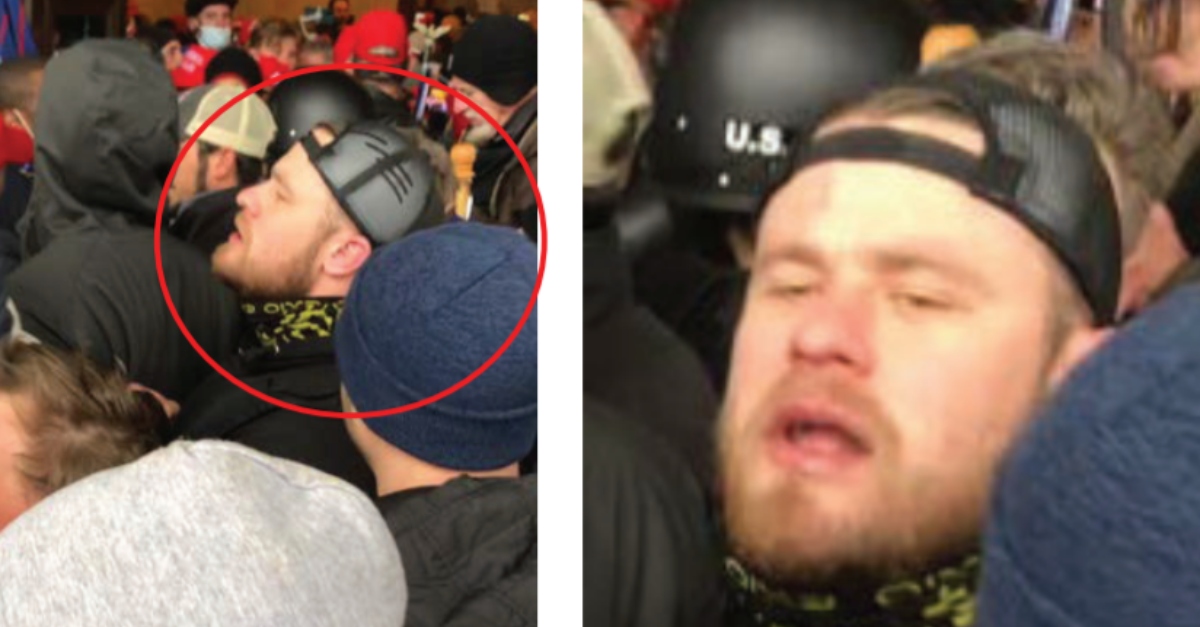
Image via FBI
Four members of the Proud Boys extremist group charged with conspiracy and obstruction in the Jan. 6 attack on the U.S. Capitol have appealed a Donald Trump-appointed judge’s denial of their request for bail hearings and motion to dismiss.
Ethan Nordean, Joseph Biggs, Charles Donohoe, and Zachary Rehl communicated and coordinated during the Jan. 6 siege, in which scores of Trump supporters overran police at the Capitol to try and stop the Electoral College vote count and certification of Joe Biden’s win in the 2020 presidential election. According to a February indictment, the men celebrated the attack on social media and in encrypted chat networks afterwards.
They have since been charged with conspiracy, destruction of government property, witness tampering, and obstruction of an official proceeding of Congress.
That last charge has proven to be a thorn in the side of prosecutors, as multiple defendants have sought to have it dismissed. So far, all of those efforts have failed.
But Nordean and his co-defendants remain undeterred, filing a notice of appeal of U.S. District Judge Timothy Kelly’s Dec. 14 order denying their motion to reopen bail proceedings, and Tuesday’s order denying their motion to dismiss.
Kelly’s opinion denying the motion to dismiss relied heavily on the Dec. 10 ruling from U.S. District Judge Dabney Friedrich, another Trump-appointed judge who has allowed the obstruction charge to stand in at least two high-profile Jan. 6 cases.
In one of those cases, U.S. v. Sandlin, Friedrich laid the groundwork upon which other judges could rely when determining whether to dismiss the obstruction charge.
Friedrich largely rejected these key arguments made by defendants: that the Electoral College certification was not an “official proceeding” for purposes of the statute, that the statute was meant to protect the integrity and availability of evidence, and that the word “corruptly” was unconstitutionally vague.
After unequivocally shutting down the “official proceeding” and protection-of-evidence arguments, Friedrich said that while “corruptly” in the statute was not unconstitutionally vague, whether a defendant acted corruptly was a fact-based determination that could vary from case to case.
Kelly, the judge in Nordean, cited to Friedrich’s ruling, but he also spent considerable time analyzing—and ultimately rejecting—the Nordean defendants’ claim that their actions at the Capitol were protected by the First Amendment right to free speech.
“It is not,” Kelly wrote. “No matter Defendants political motivations or any political message they wished to express, this alleged conduct is simply not protected by the First Amendment. Defendants are not, as they argue, charged with anything like burning flags, wearing black armbands, or participating in mere sit-ins or protests. Moreover, even if the charged conduct had some expressive aspect, it lost whatever First Amendment protection it may have had.”
U.S. District Judge Amit Mehta, a Barack Obama appointee, has similarly denied efforts by another Jan. 6 defendant to get the obstruction charge dropped.
Nordean’s notice of appeal was not his only legal action on Wednesday. He also filed a request for an evidentiary hearing in support of his claim of “selective enforcement,” signaling his apparent intention to try and force the government to explain why he has been charged with relatively serious crimes relating to Jan. 6 while others he claims are “similarly situated” have either been ignored by the government, or face less serious charges.
[Image via FBI]